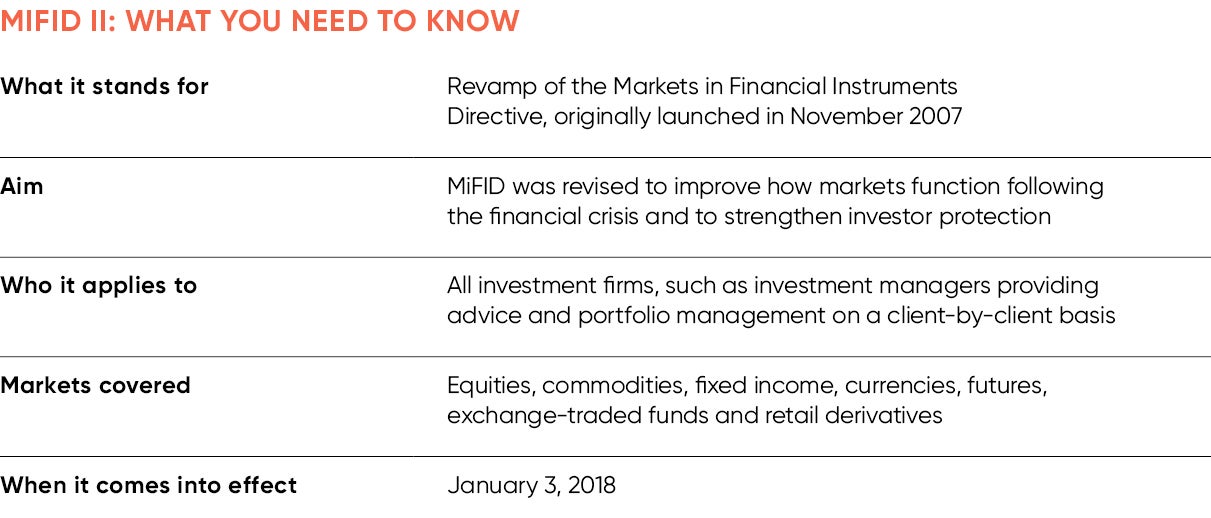From January 3, 2018 all trading platforms in the UK will be subject to a new set of rules, designed to improve customer trust in investment products and safeguard against surprise costs or charges.
The second iteration of the Markets in Financial Instruments Directive or MiFID II was drawn up after the 2008 financial crisis. Following the crash, European policymakers started looking more closely at how financial companies treated consumers and decided their approach to communicating needed further revision.
For investment companies and trading platforms, it means radical changes in their behaviour and has cost these businesses a significant amount of investment to ensure they comply with the new rules by the January deadline.

Bernadine Reese, UK lead on MiFID II regulatory compliance at consultancy group Protiviti, says one of the stated aims of the new rules is to increase protection for retail investors.
“MiFID II will introduce improved transparency in financial markets, particularly in fixed income and commodity markets, and also in equity markets,” she explains. “MiFID II also tightens requirements on inducements, how investment research is purchased and in addressing conflicts of interest.”
The new regulations can be split broadly into three areas of costs, communications and audit.
The new rules on costs mean retail traders will benefit from a more comprehensive breakdown of the charges they incur. For example, if they are buying or selling a fixed income asset, then they can expect to receive a comprehensive explanation of any “implied costs” which would have previously been rolled up into a figure related to the spread.
Customers can expect more specific information on costs arising from executing the trade, research bought, data captured and client reporting. Other related administrative costs will also now have to be explicitly documented.
Retail investors and retail traders will have an abundance of new information to weigh up the value they get from their providers. However, this is unlikely to be something they will find overwhelming, according to Chris McCullam, principal consultant at Altus Consulting, who explains that many of the rules simply build on a previous rule book known as the Retail Distribution Review.
“The new rules go further in terms of fees and charges disclosure to bring greater transparency and clarity over what actually the costs will be for investments,” he says. “These disclosure rules are challenging for retail platforms as the charging structures for funds and packaged investments are often opaque, and certain costs are only known ex-post.”
While the regulations may indeed be a source of frustration for the businesses, the results should provide clients with more information to judge their providers.

MiFID II is poised to transform financial markets across Europe
Aside from cost disclosure, the second element of the new ruleset, communications, has been another headache for compliance teams at these businesses, as the new directive will mean companies have to be far more explicit about their commercial models.
At its most extreme, it will mean they now have an obligation to do more to make customers aware if their investments are doing badly, with more frequent client warnings required if portfolio values drop by more than 10 per cent.
On a day-to-day level, the new rules require that all communications between the customer and the company are documented, quickly and securely, in one place. This has to include emails, electronic messages, social media interactions and transcripts of telephone calls. The idea behind this is to ensure that complaints or disputes can be more speedily resolved, again giving more power to the customer.
Ian Hook, vice president of European business operations at data consultancy group Smarsh, explains that brokers and investment managers must record and supervise all communications that result in a transaction. “This means any conversations either with external parties or internally within the firm and irrespective of whether a trade actually happened,” he says.
Organisations are struggling to control and manage all the available communications channels, which may include business collaboration tools such as Slack, Workspace by Facebook and Microsoft Teams, says Mr Hook. This creates significant exposure to “unprecedented risk and vulnerability”. Risky or not, companies will be expected to have this covered by the January deadline or chance stark punishments from the UK’s financial regulator, the Financial Conduct Authority.
The final part of the MiFID II rule book is the audit requirement. Essentially, this is designed to ensure that both companies and regulators have a better understanding of clients and tailor their services appropriately.
In drawing up the regulations, European policymakers found numerous examples where investment providers had sold retail clients inappropriate or overly complicated investment products. The new rules are, therefore, designed to ensure that the products made available are suitable for the clients buying them.
While the intention was a good one, it could result in retail customers being forced to complete more comprehensive application documents before opening accounts and being subject to more regular checks to ensure their level of knowledge is appropriate to the products they are buying.
Protiviti’s Ms Reese explains that regulators want customers to have greater confidence in product design and want businesses to have the end-customer in mind when developing new products or services.
“This is intended to provide greater investor protection for execution-only trading on more complex instruments and products,” she says. “However, this may result in more detailed form filling or admin checking and assessments of competence, even for those who are experienced retail investors.”
A more onerous part of the audit process relates to traders working on behalf of organisations. For this group, there are new requirements designed to enable regulators to track cash flowing around the world.
An efficient and clean market is ultimately to the benefit of both retail and wholesale traders – and investors
The regulator has stipulated that some clients will need to have a new legal entity identifier (LEI) number, a 20-digit code, to help monitor financial transactions worldwide. If you are a trader for a charity, a trust or an unincorporated institution, you will need to be issued with an LEI code by the deadline. Platforms will not be able to execute your trades if you have not been issued with one of these. Altus Consulting’s Mr McCullam says: “The rules are clear. No LEI means no trading.”
According to Mr McCullam, 71,000 LEIs had been issued by the end of October 2017, including 10,000 in October alone. He says the London Stock Exchange is expecting the total number of LEIs to double by January.
With just weeks remaining until the new rules come into play, some financial providers have questioned whether the changes were really necessary, warning that the vast investment to meet the requirements may result in some confused customers. Despite this, MiFID II will, at the very least, offer the retail trader access to more information.
“Retail customers stand to gain from these changes,” Ms Reese concludes. “An efficient and clean market is ultimately to the benefit of both retail and wholesale traders – and investors.”


